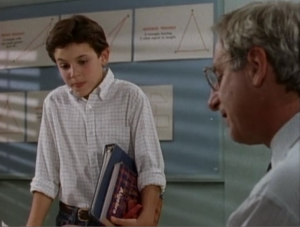I really enjoyed Math Class, the first episode centered around Mr. Collins’ algebra class, and I enjoyed Math Class Squared, its sequel, even more.
The first half of this episode puts Kevin in a believable, morally complex conflict: Should he rat out the his cheating classmates? It’s a tough question that has been answered a lot of different ways throughout the history of coming-of-age TV shows.
Kevin decides not to, but ultimately gets seduced to cheat himself after he sees how easy it is. Credit the great exposition at the beginning of the episode to set up Kevin’s respectable status quo of being an average student, as well as Math Class’s impressive work at tying Kevin’s success in math to his pride, that it really hurts watching Kevin submit to the pressure of cheating.
Maybe the most compelling part of the episode is watching Kevin’s conscience battle the growing rewards of cheating — gerat grades, praise from his parents, respect from his peers, even attention from Winnie Cooper. But he knows he doesn’t deserve it, and, as the beginning of the episode established, takes a lot of pride in how much effort he puts into getting his C’s.
The whole bit about Kevin being temporarily switched into the advanced math class didn’t work as well as the rest of the episode — in a way, he actually got punished a lot less by being singled out because he didn’t flunk his unit test; plus, what did it really achieve? Kevin already knew he’s not a natural at math, so it’s hard to say he learned anything — but the rest of the episode worked strongly enough that it didn’t really bother me.
Just as the original Math Class, Math Class Squared was grounded by Steven Gilborn’s excellent work as Kevin’s algebra teacher. Gilborn continues to nail the math teacher vibe (seriously, when I see him, I see an exact hybrid of two professors I had in college). No-nonsense, passionless, intelligent, perceptive, and detached, Mr. Collins makes for a very understated character that contrasts to some of the hilarious extremes of the other teachers on this show.
The fantasy sequences peppered throughout the episode, particularly the show-stopper towards the end of the episode of everyone talking about numbers morphing into The Twilight Zone, only added to the episode.
The strong conflict at the core of the episode, along with the great work by Gilborn and Fred Savage, make this episode a delight and a step up from most of the past few episodes.
A few other thoughts:
- Coach Cutlip’s speech about doing what you need to win and the dodgeball scene provided a nice metaphor for the cheating, even if they just served to remind me of the far better dodge ball scene in the Freaks and Geeks pilot.
- It struck me as a moment of slight meta-comedy when Mr. Collins commented on Kevin’s expressive facial expressions, which often underscore the narration and go unnoticed by the rest of the world.






I disagree with your take about moving Kevin up to the advanced class. It was a very clever move on the part of Mr. Collins to move Kevin up to the advanced class. While Kevin thought Collins was oblivious to the situation, he was really setting the other cheating students up for a colossal downfall. Collins wanted Kevin to know there were consequences for his actions, but the teacher wanted to protect the essentially honest student at the same time.
Interesting read on the episode. Thanks for reading, RadioMattM!
I’m seven years late to the party, but this was my exact take on it. Collins knew the other students were cheating even before Keving tried to bring it to his attention. With a knowing look, he tells Kevin first at that first encounter, “Every problem has its own solution.” He’s way ahead of all the kids. He also knows Kevin is working hard but suffering collateral damage from grading on the curve. So when Kevin buckles and caves to the cheaters, Collins has a little bit of sympathy and moves him out of the way of the bomb he’s about to drop on the cheating students. Kevin still has a price to pay but a smaller price than the others. Brilliant move.